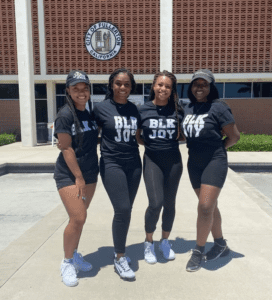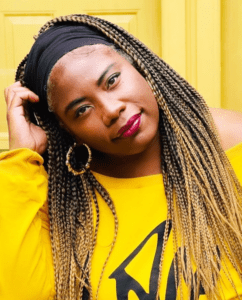Black Joy
While the events that led to the ultimate creation of the national holiday known as Juneteenth may be over 160 years in the past, there is no time like the present to embrace Black joy. But what is Black joy and why is Juneteenth a time for us to embrace it? And what does it mean to “embrace” Black joy? Read on to learn the answers to these questions and more as we embrace Black joy.

Elaine Nichols (pictured here) is a Senior Curator for Culture at the National Museum of African American History and Culture
What is Black Joy?
Even after a group experiences liberation, this newfound freedom does not erase the pain and trauma they have faced. It can still be felt, and unfortunately, can still be seen trickling down through the generations. This pain has been the focus of many writings and Hollywood blockbusters and continues to be the narrative preferred when talking about the Black community in America. But among the tracks and scars caused by trauma, there is a river of resilience, hope, and joy that flows and connects a community together.
Black Joy is not an attempt to erase the trauma and pain the Black community has experienced but is a community reclaiming its narrative. Despite all the obstacles that the Black community has and continues to experience in American society, there is cause for celebration and reason to take up space to celebrate Black culture. According to Elain Nichols, “At the heart of the Black Joy movement is what many scholars, journalists, authors, and others are describing as resistance, resilience, and reclamation of Black Humanity”.

Upset Homegirls is a nonprofit organization started by, from left to right, Ariel Parker, Larissa Odd, Brandy Factory, and Esther Fagbamila, after the 2020 murder of George Floyd.
Juneteenth & Black Joy?
On January 1, 1863, President Abraham Lincoln issued the Emancipation Proclamation dictating that all enslaved persons in the “rebellious states” were free. For many of us, this was taught as the moment that all slaves were freed in America. But for most enslaved folks in the “rebellious states,” this proclamation was little more than lip service and many of them were not aware of this proclamation. They continued about their day; they did the tasks that were demanded of them; they were still brutalized and treated like property, families were still torn apart, and nothing changed. Though they were freed, it was not enforceable in the land still under Confederate control. Slowly this decree of freedom made its way into the rebel-controlled places, and finally on June 19, 1865, in Galveston Bay, Texas, freedom was announced for the more than 250,000 enslaved black folks. This day came to be known as Juneteenth.
Even after June 19, 1865, when emancipation finally came for Black folks in Texas, the path forward in American society was not without pain and continued torment. So why celebrate the anniversary of your liberation when you do not experience all the freedoms that this country offers? The answer is rooted in communities embracing Black joy and reclaiming their narrative. It is in the choice to see the injustice they face due to white supremacy and turn to celebrate, inspire, and uplift Black culture in an act of resistance against white supremacy. In 2020, Upset Homegirls co-founder, Brandy Factory said,
“Black Joy affirms that I am not a victim. I am an agent of change. It rejects the idea that violence… injustice, discrimination, prejudice, and dominance over others are normal and acceptable actions.”
As communities come together to celebrate Juneteenth, it is with the spirit of embracing Black joy. We get together with music, food, and celebration to highlight how far the Black community has come and to root ourselves in hope for how far there still is to go. This spirit of celebration is for everyone, no matter your race, culture or background. You do not have to be from the Black community to embrace Black Joy.

Tracey Michae’l Lewis-Giggetts 2022 book, Black Joy: Stories of Resistance, Resilience, and Restoration was awarded the NAACP Image Award for Outstanding Literary Work.
How Can Others Embrace Black Joy?
Society has often said that the plight of the Black Community has long been over. There has always been a movement to make the Black community small and that movement has always been rooted in white supremacy.
“Stop making it a race issue.”
“Don’t play the race card.”
“Don’t listen to that music, it’s too loud and angry.”
“Stop talking like that.”
“Don’t eat that, it’s bad for you.”
All these common phrases have a root in attempting to make the Black community take up less space in American society. So, what does that mean for the person who is not a part of the Black community and how might you support embracing Black joy?
Embracing Black Joy: Uplift Black Voices
When society attempts to silence Black voices, use your position and the privilege you hold to uplift Black voices. Embracing Black joy is uplifting the voices and reclaiming the narrative of the Black Community from a place of victimhood to a position of resilience and strength. Consider supporting the following organizations that are doing amazing work uplifting Black voices in our community:
- Harriet’s Books & Ida’s Books work to highlight black and brown voices through writing, art, and activism.
- The Black Brain Campaign works to eradicate the stigma of Mental Health in the black community and reclaim the narrative of healing and resiliency.
Embracing Black Joy: Challenge White Supremacy
In a society rooted in and built on white supremacy practices, take time to challenge long-held beliefs about race in this country. Go out of your comfort zone and connect with communities that you would not otherwise engage with. Read literature and connect with the art that is rooted in the Black community. Give yourself the opportunity to try foods that are staples in Black communities and may stand outside what American society has stereotyped as “Black food.”
When it comes to literature, check out some of the following books:
- Black Joy: Stories of Resistance, Resilience, and Restoration
- You Are Your Best Thing: Vulnerability, Shame Resilience, and the Black Experience
- Black Boy Joy: 17 Stories Celebrating Black Boyhood
- The Hill We Climb: An Inaugural Poem for the Country
- Black, White, and The Grey: The Story of an Unexpected Friendship and a Beloved Restaurant
Embracing Black Joy: Celebrate
For Juneteenth there are many local opportunities to celebrate with the Black community so take the opportunity to do some research. Who is gathering? Where are they gathering? How can I get involved? If you are not a part of the Black community, you can still take the time to uplift and support these gatherings and come together in the spirit of promoting Black joy. If you can not get out to a celebration, another way to embrace Black joy is by supporting Black artists. The following are just some of the amazing Black artists in the Philadelphia region who deserve your support:
- GOLD + WATER CO. is a black woman-owned boutique soapery and wellness advocate in Philadelphia, PA embracing the ideals that “you are the luxury”.
- Urban Art Gallery’s goal is to create an exciting venue where emerging artists can exhibit and sell their work.
- Mount Airy Candle Co. offers handmade gifts for loved ones and is a black-owned operation located in Philadelphia.
Part of Black Joy is reclaiming your narrative. It is transitioning from victim to resilient. This is hard work, and you do not have to do it alone. Reach out to Council for Relationships today and connect with one of our therapists to support you on your journey.

Allen-Michael Lewis, LMFT, AS, is a founding member of CFR’s Racial Equity Working Group.
About the Author
Allen-Michael Lewis, LMFT, AS, is Council for Relationship’s Director of Clinical Internships and is a Staff Therapist. If you have questions about Black joy or Juneteenth, or if you would like to request an appointment with Allen-Michael, click here.
If you are looking for individual, couple, or family therapy or psychiatry, click here to request an appointment. See our Therapist & Psychiatrist Directory to find additional CFR therapists or psychiatrists near you.
More from CFR
